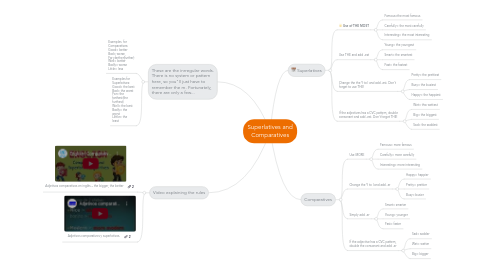Superlatives and Comparatives
저자: Alexis Moreno


1. These are the inrregular words. There is no system or pattern here, so you"ll just have to remember the m. Fortunately, there are only a few...
1.1. Examples for Comparatives: Good= better Bad= worse Far=farther(further) Well= better Badly= worse Little= less
1.2. Examples for Superlatives: Good= the best Bad= the worst Far= the farthest(the furthest) Well= the best Badly= the worst Llittle= the least
2. Video explaining the rules
2.1. Adjetivos comparativos en inglés – the bigger, the better
2.2. Adjetivos comparativos y superlativos.
3. Superlatives
3.1. Use of THE MOST
3.1.1. Famous=the most famous
3.1.2. Carefully= the most carefully
3.1.3. Interesting= the most interesting
3.2. Use THE and add -est
3.2.1. Young= the youngest
3.2.2. Smart= the smartest
3.2.3. Fast= the fastest
3.3. Change the the Y to I and add -est. Don't forget to use THE!
3.3.1. Pretty= the prettiest
3.3.2. Busy= the busiest
3.3.3. Happy= the happiest
3.4. If the adjectives has a CVC pattern, double consonant and add -est. Don't forget THE!
3.4.1. Wet= thw wettest
3.4.2. Big= the biggest
3.4.3. Sad= the saddest
4. Comparatives
4.1. Use MORE
4.1.1. Famous= more famous
4.1.2. Carefully= more carefully
4.1.3. Interesting= more interesting
4.2. Change the Y to I and add -er
4.2.1. Happy= happier
4.2.2. Pretty= prettier
4.2.3. Busy= busier
4.3. Simply add -er
4.3.1. Smart= smarter
4.3.2. Young= younger
4.3.3. Fast= faster
4.4. If the adjective has a CVC pattern, double the consonant and add -er
4.4.1. Sad= sadder
4.4.2. Wet= wetter
4.4.3. Big= bigger

